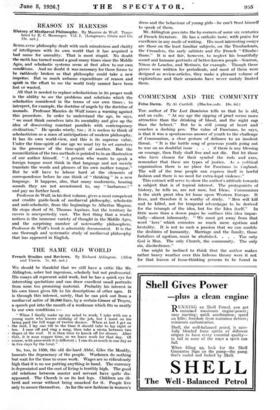THE SAME OLD WORLD
French Studies and Reviews. By Richard Aldington. (Allen and Unwin. 'is. 6d. net.) WE should be thankful that we still have a critic like Mr. Aldington, sober but ingenious, scholarly but not professorial. His essays all represent solid• work, but he has a quick eye for interesting quotations and can draw excellent small portraits from none too promising material. Probably his interest in his own times gives life to his descriptions of other ages. It is through this interest, surely, that he can pick out from a mediaeval satire of 30,000 lines, by a certain Grocer. of Troyes, a speech put into the mouth of a workman which fits so neatly to our own conditions :— " When I. finally make up my mind to work, I take with me a young mate who knows nothing of the job, but I insist on his being paid the full wage of twelve deniers. When at last I get on • the roof, I lay one tile in the time it should take to lay eight or ten. I ease off and sing a gong, then take a siesta between two
• slopes of the roof. It is then time to knock off for dinner. After that, it is soon supper time, so we leave work for that day. Of • course, with piecework it is different ; 1 can do as much in one day as in five days by the hour."
So, too, in 1350, the old die-hard Abbe, Giles the Mouldy, laments the degeneracy of the people. Workmen do nothing but wait for the time to cease work. Wages are so ridiculously high that it is no use putting anything in hand. The currency is depreciated and the cost of living is terribly high. The good old relations between master and -servant have quite die; appeared. The Church is on its last legs. Children are in- bred and swear without being smacked for it. People live only to amuse themselves. As for the new fashions in women's
dress and the behaviour of young girls—he can't trust himself to speak of them.
Mr. Aldington goes into the by-corners of some six centuries of French literature. He has a catholic taste, with praise foi excellence in any mode of writing. His most interesting essays are those on the least fatniliar subjects, on the Troubadours, the Crusaders, the early satirists and the French " Elizabei thans." It is not fair, however, to neglect his beautifully sound and humane portraits of better-known people—Scarron, Ninon de Lenclos, and Merimce, for example. • Though these pieces were written for 'periodicals, and most of them were designed as review-articles, they make a pleasant Volume of explorations and their occasions have never unduly limited them. •










































 Previous page
Previous page